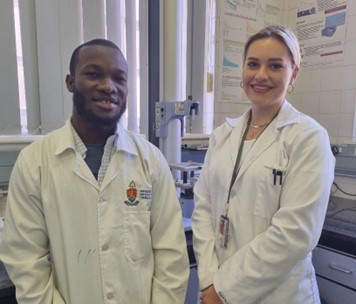Students Afees Oduola and Nitzia Homann
By AO Oduola, NM Homann, N Mehlomakula and MN Emmambux , Department of Consumer and Food Sciences, University of Pretoria
As part of the initiative to propel the LEAP-RE SUNGARI project, there is a need to understand the physicochemical and microbiological perspective of gari. Postgraduate students Afees and Nitzia developed a pilot scale gari manufacturing process following standard procedures under the supervision of Prof MN Emmambux and Dr NN Mehlomakulu. They were able to come up with improved methods that put processing conditions under high-level control and hygiene.
Cassava roots procured from the South African market, were processed to produce gari similar to other African countries including Ghana, Nigeria, and Togo. As opposed to the traditional approach of fermenting cassava mash, they conducted fermentation procedures under a controlled temperature. Another novelty of their contribution is the implementation of spontaneous and inoculated fermentation approaches to better understand the possible impacts of inoculation and by extension, the desirability of the final products. Fermentation time was varied to understand the difference it makes in the final product.
They analyzed the product to determine the population of lactic acid bacteria, total aerobic bacteria, yeast, and mould. The total soluble solids, pH, and total titratable acid were also determined for all the products at various stages of fermentation.
Furthermore, the rheological and thermal properties for the 48-hour fermented mash and the roasted samples were determined and compared. Further analyses are being conducted to have a bird’s-eye view of the physicochemical and microbiological properties of gari products produced from spontaneous and inoculated fermentation. This will help in bringing an improved product to the market to drive economic growth.
The SunGari project aims to develop Modern Energy Cooking Service based on solar cooking (photovoltaics and concentrated solar power) for Gari processing in West Africa. Gari is a staple food in West Africa.
More about SUNGARI: https://www.leap-re.eu/sungari/




